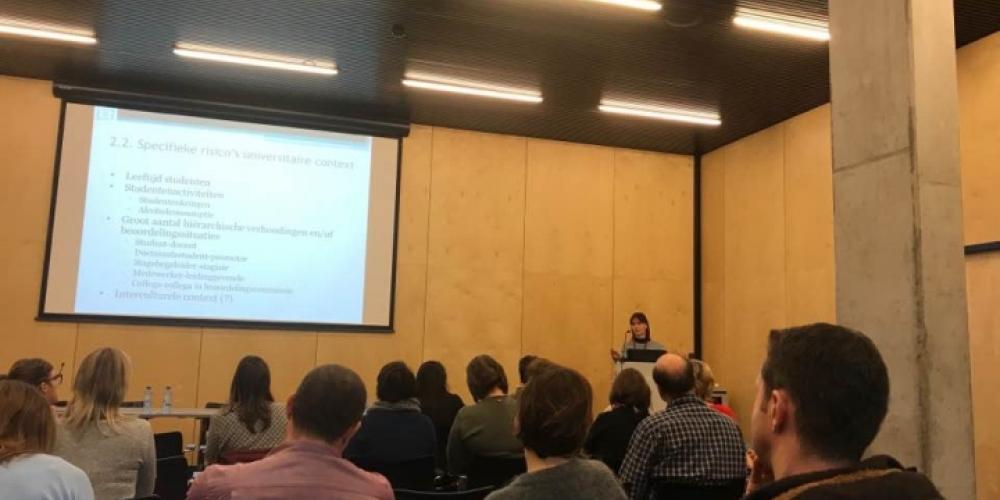
NULLIt isn’t always easy to be critical of oneself, but the VUB still chooses to go into dialogue about inexcusable behaviours. The participants of the seminar on overstepping boundaries that took place on Tuesday morning were taught about this by the adjunct-director of the institute for the equality of women and men, Prof. Dr. Liesbeth Stevens.
The lecture started with an explanation of the phenomenon. What is inappropriate behaviour? Which kinds of sexism exist? And what kind of (legal) steps can victims take?
Early on in the lecture we learn that there has been barely any research been done about sexual intimidation and other types of unwanted behaviour. Due to budget cuts, the institute now relies on international studies that include Belgium for statistics. Students and researchers that want to research this topic, are, therefore being encouraged to actually do so.
The small amount of statistics available about sexual intimidation says it all. For example, according to research done by the Fundamental Rights Agency of the European Union in 2014 the age group with the highest percentage of members that dealt with sexual intimidation during the last 12 months were 18 to 29 year olds.
The university context
This is an age category that is highly represented at universities in general – and the VUB is no exception. There are a few specific risks of inappropriate behaviour connected with a university context, explains Prof. Dr. Liesbeth Stevens. For example, hierarchical relationships between students and professors and the heavy drinking associated with student activities are some of these risk factors.
These are elements that need to be taken into account when making behavioural guidelines for a university.
But, the adjunct-director stresses that this doesn’t mean that we shouldn’t leave any space for experimenting. Student years are traditionally a moment when people push their own boundaries. What is seen as normal conduct and acceptable behaviour during student years should be taken into account when writing guidelines. The university shouldn’t expect it’s students to change their drinking habits, but can expect them to take good care of each other and to act when things are heading in a wrong direction.
The grey zone, that isn’t a grey zone at all
‘Is nothing allowed anymore?’ – some people wondered at the height of the #MeToo campaign. They shouldn’t despair. According to Prof. Dr. Stevens the grey zone isn’t as grey as people seem to think. Inappropriate behaviour is not subjective and can be classified by certain factors e.g. mutual consent, voluntariness, equality, etc. These factors allow for behavioural guidelines to be put in place.
It is for example still okay to ask your colleague out for a drink, as long as you don’t keep repeating the invitation once you’ve been shot down.
The boundaries of acceptable behaviour are guarded by the law. Both labour law, anti-discrimination law and criminal law allow legal action against unwanted behaviour, but it doesn’t always need to come to this. A lot of inappropriate behaviour can be avoided by creating a safe working environment.
What can the VUB do?
The university of course plays an important role in the creation of this safe environment. Not only does it have to inform and sensitize its students, professors and employees about the issues at the university, but they also have to make sure their help desks are approachable and that perpetrators don’t get away with their behaviour.
Of course, this isn’t an issue that can be fixed immediately. It takes time to put the right structures and helplines in place. Or as Raf Devos, Director of the ‘Mens en organisatie’ department of the VUB says: ‘You can only help people, if there is a structure that allows it.’
‘We need to question ourselves, even if it feels uncomfortable.’
There is still some space left for the VUB to grow, Rector Caroline Pauwels admits in her conclusion speech, but this event is only the beginning of a path towards a safer environment at the university. Not only does the VUB want to better the communication of their helpline ‘Meldpunt’, but they also want to educate staff, beginning with senior members about their power over junior staff and students and how to handle it.
The university isn’t the only one that can make a difference. We ourselves could also play an important role. It is a lot easier for a bystander to speak up against sexism, discrimination or bullying than for the person that’s being targeted. Together we can create a safe university environment.
The seminar on inappropriate behaviour at the university is part of the ethics week. Do you want to know more about ethical behaviour in science? Take a look at the programme and participate in the events.